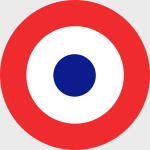Hobby Master HA1103 French Navy Grumman F6F-5 Hellcat Mk. II Fighter - Flottille-Squadron, Indochina, 1953 (1:72 Scale)
"Why should we have a navy at all? There are no enemies for it to fight except apparently the Army Air Force."
- General Carl Spaatz, Commander of the US 8th Army Air Force, after WWII
 The F6F embodied the early lessons learned by users of Grumman's previous fleet-defense fighter, the Wildcat. In June 1941, Grumman lowered the wing center section to enable the undercarriage to be wider splayed, fitting more armor-plating around the cockpit to protect the pilot while also increasing the fighter's ammunition capacity. When the prototype made its first flight, it was realized that a more powerful engine was needed to give the fighter a combat edge. A Pratt & Whitney R-2800-10 engine was installed for added power.
The F6F embodied the early lessons learned by users of Grumman's previous fleet-defense fighter, the Wildcat. In June 1941, Grumman lowered the wing center section to enable the undercarriage to be wider splayed, fitting more armor-plating around the cockpit to protect the pilot while also increasing the fighter's ammunition capacity. When the prototype made its first flight, it was realized that a more powerful engine was needed to give the fighter a combat edge. A Pratt & Whitney R-2800-10 engine was installed for added power.
The aircraft made its combat debut in August 1943, and from that point on, the question of aerial supremacy in the Pacific was never in doubt. Hellcats served aboard most of the US Navy's fleet carriers, being credited with the destruction of 4,947 aircraft up to V-J Day. The Fleet Air Arm was also a great believer in the Hellcat, procuring almost 1,200 planes between 1943-45. The Hellcat saw only limited service in the post-war years, being replaced by the more powerful F9F Bearcat. Of the nine F6Fs believed to be airworthy today, seven are based in the USA and two are located in the UK.
This particular 1:72 scale French Navy Grumman F6F-5 Hellcat Mk. II fighter was attached to the Flottille-Squadron during the Indochina Conflict in 1953.
Sold Out!
Dimensions:
Wingspan: 5-inches
Length: 5-inches
Release Date: March 2007
Historical Account: "Exit the French" - During the First Indochina Conflict, the US was supplying its French allies with military aid. The outbreak of the Korean Conflict in 1950 changed everything for the Americans. Seen from Washington, what had been a colonial war in Indochina became another example of expansive world-wide communism, directed by the Kremlin. In 1950, the US Military Assistance and Advisory Group (MAAG) arrived to screen French requests for aid, advise on strategy, and train Vietnamese soldiers. In 1956, MAAG assumed responsibility for training the Vietnamese army. By 1954, the US had given 300,000 small arms and machine guns, plus one billion dollars to support the French military effort and was shouldering at least 80 percent of its cost.
The Viet Minh eventually handed the French a major military defeat at Dien Bien Phu; on May 7th, 1954, and the French public and government had had enough. At the Geneva Conference, the French government negotiated a peace agreement with the Viet Minh which allowed the French to leave Indochina and granted all three of its colonies, Cambodia, Laos, and Vietnam their independence. However, Vietnam was temporarily partitioned at the 17th parallel, above which the Viet Minh established a socialist state, the Democratic Republic of Vietnam and below which a non-communist state was established under the Emperor Bao Dai's Prime Minister, Ngo Dinh Diem, shortly thereafter removed him from power, and established himself as President of the new Republic of Vietnam.


